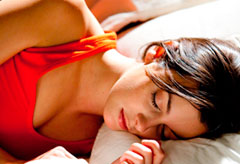Sleeping with a light on can cause depression
According to new research, those who like to sleep with the light on are more likely to experience depression.

According to new research, those who like to sleep with the light on are more likely to experience depression.
Sleeping with a night light, or even in front of the glow emitted by a TV, may affect the structure of the brain, and raise the likelihood of depression, scientists have warned.
Findings from a new stufy are just the latest in a line of possible dangers surrounding the disruption of the body’s natural sleep-wake cycle.
Tracy Bedrosian, co-author of the study by Ohio State University, said, ‘Even dim light at night is sufficient to provoke depressive-like behaviours.’
The Society for Neuroscience’s annual conference heard that even the presence of a dim light is enough to impact on mental processes with experts suggesting the findings could have serious implications for health.
The study looked at the effect of exposing rodents to dim light for the period of eight hours during which they would usually sleep, for a period of eight weeks.
The findings showed that those rodents exposed to dim light exhibited more symptoms of depression compared with those in the standard light-dark cycle.
Marie Claire Newsletter
Celebrity news, beauty, fashion advice, and fascinating features, delivered straight to your inbox!
Bedrosian concluded, ‘The hippocampus plays a key role in depressive disorders; so finding changes there is significant.
Neuroscientist Dr Randy Nelson added, ‘The light was a very low level. Something that most people could easily encounter every night.’
Previous studies have also found that the presence of dim light at night is linked to weight gain, while shift workers are reportedly at a higher risk of developing breast cancer due to the disruption to their sleep-wake pattern.
-
 The 10 best dresses celebrities from Tiffany & Co.'s Blue Book 2025 Gala
The 10 best dresses celebrities from Tiffany & Co.'s Blue Book 2025 GalaCelebrating the brand's marine-inspired collection
By Sofia Piza
-
 These are the 11 cult designer buys of spring 2025—and they're already selling out
These are the 11 cult designer buys of spring 2025—and they're already selling outFrom Miu Miu's must-have cowboy hat to Loewe's latest bag
By Clementina Jackson
-
 Prince William and Princess Kate have announced their 14th wedding anniversary plans
Prince William and Princess Kate have announced their 14th wedding anniversary plansBy Jenny Proudfoot